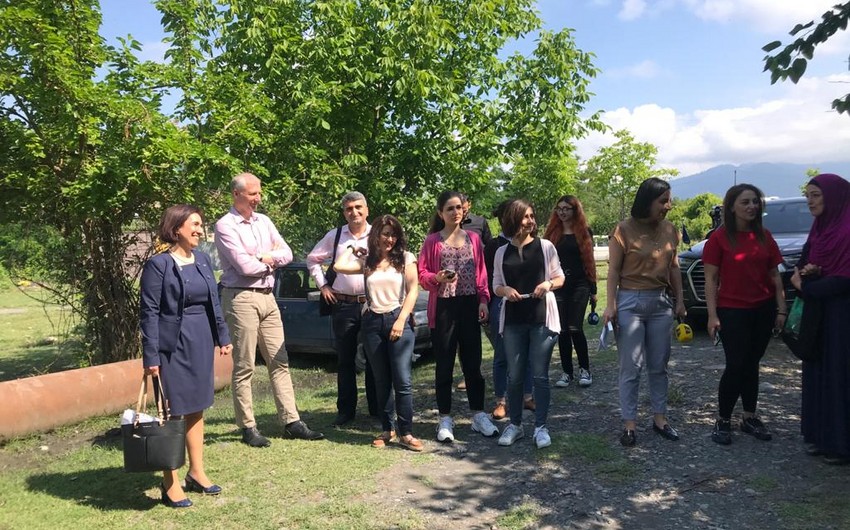Cooperation between the EU and Azerbaijan is beginning to actively spread to the regions. Through funding, the EU supports various projects, which mainly cover agriculture, education, etc.
Head of the EU Delegation to Azerbaijan Kestutis Jankauskas and media representatives got acquainted with the regional projects in more detail, Report informs.
One of the projects is dedicated to the food industry. So, as part of the COVCHEG project (Community-based Value Chain Enhancement in the Greater Caucasus Mountains of Azerbaijan), funded by the EU and implemented together with the Azerbaijan Tourism Board, ‘Slow Food Travel’ seminars will be organized in five regions - Shamakhi, Ismayilli, Gabala, Sheki, and Gakh.
The seminar will cover topics such as the introduction of Slow Food Travel in Azerbaijan, tourism experiences according to Slow Food, and ways to improve agritourism hotel/small producers services under the guidance of local and international experts. The beneficiaries of the project, including regional agricultural producers, representatives of hotels, restaurants, and nature reserves, will take part in the seminars.
The project will be carried out in these regions to enhance the value of local identity and gastronomy, preserve biodiversity and cultural heritage, create sustainable livelihoods. This will not only expand the knowledge and skills of the beneficiaries but will also lead to the creation of a concrete model for the development of the food chain, as well as tourism products and practices in the pilot areas, which in general will serve as a model for further development throughout the country. In the long term, this will positively affect the state of natural resources and the social environment, reduce the level of unemployment and emigration, and increase the resilience of local territories.
The EU pays special attention to women’s entrepreneurship during the COVID-19 pandemic. Despite the coronavirus pandemic has damaged the entire business sector globally, the EU continues to provide grants that are aimed at personal growth and can benefit other people.
So, during the visit of Jankauskas and journalists to the regions of Azerbaijan, they managed to get acquainted with women, who, despite the difficulties, were able to build their own small business and successfully develop it. One of them is 41-year-old Sevinj Seyidova from the Ismayilli region. Due to her poor financial situation, Sevinj couldn’t afford to buy equipment and tools, fabrics, and other necessary materials to develop her sewing business and receive more orders. With the initial capital provided by the project - 820 manats, Sevinj Seyidova rented a place in the center of Ismayilli, which can attract more clients and provide tailoring services. With financial support, she purchased the necessary equipment, tools, materials. Although very little time has passed since the receipt of funds, her income has grown significantly.
No less important is the acquaintance with the beneficiary of the Accelerating Development of Sustainable Microentrepreneurship in Rural Regions of Azerbaijan project (ADSMIRRA) and Youth Entrepreneurship project – Rugiyya Karimova. Rugiyya lost her husband early and had to raise two children, 15 and 18 years old, on her only teacher’s salary. Her 18-year-old son has cerebral palsy. Since her teacher’s salary barely covered the family’s expenses, Rugiyya wanted to pursue an activity that could bring her additional income. Rugiyya is the beneficiary of the EU-funded Youth Entrepreneurship Project, implemented by Junior Achievement Europe. Having joined the project, she decided to take up beekeeping and received an initial capital of 1,500 manats. Her father also helps her in this matter. Despite her difficult life, she doesn’t complain. On the contrary, she wants to develop her business even more and admits that she would like to get royal jelly in the future, although this is not an easy task.
Fishing has also been actively developing in Gabala in recent years. Beneficiary Alik Matilov owns a fishing farm and is engaged in mainly trout breeding. He received advisory and informational support on improving fish feeding and increasing fish productivity in reservoirs. The primary support aimed to enhance fish breeding technology and growing, providing the fishery owner with the necessary feed, etc. The EU ambassador and the journalists themselves got acquainted with the process in more detail and shared their impressions.
In conclusion, in an interview with reporters, Jankauskas said: “We are considering many projects related to various areas that the EU has funded and will continue to finance. The little assistance they will receive is very important in the lives of families. First, I think that everything in our life starts with education and all we can do is give our children a better education.”
Jankauskas believes that the greatest wealth of Azerbaijan is its people.
“People with character, willingness, and determination to fight for survival, income, for their families, getting a job, skills, and we support such families,” the ambassador said.
“Thirdly, these are the regions ... and we have to travel more to see a beautiful country. It has something to offer in terms of nature, traditions, customs, hospitality. That is, the support of the regions determines the development of the country,” he added.


 https://static.report.az/photo/f67c1eee-4df3-3d6d-92f9-f0f3ad6cc675.jpeg
https://static.report.az/photo/f67c1eee-4df3-3d6d-92f9-f0f3ad6cc675.jpeg

